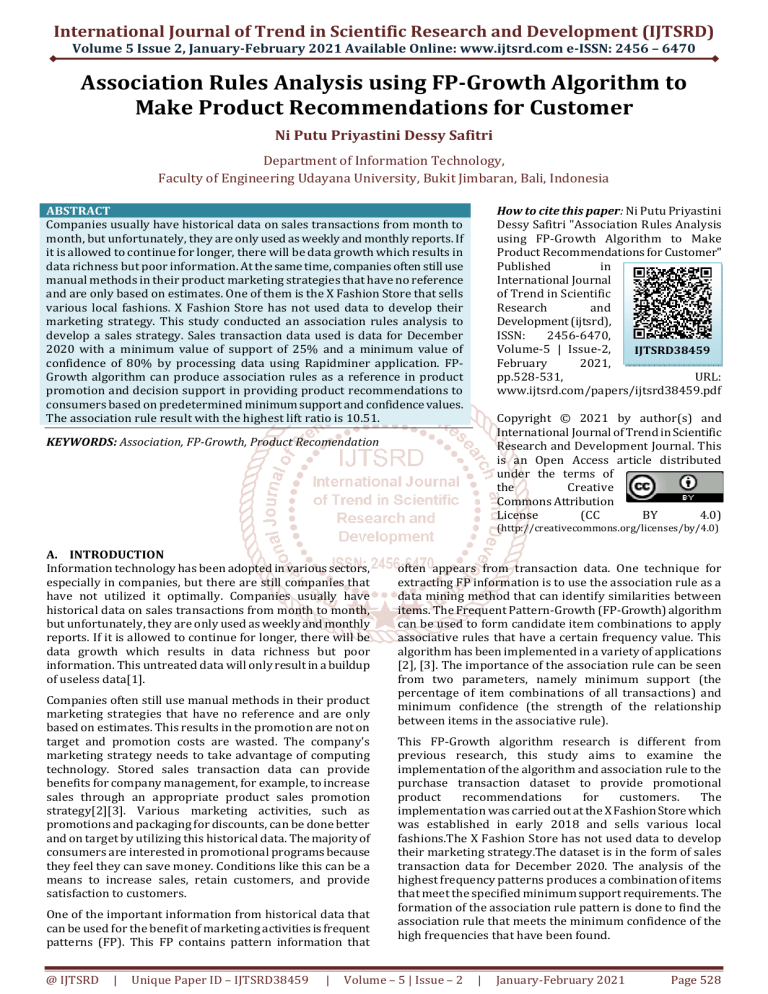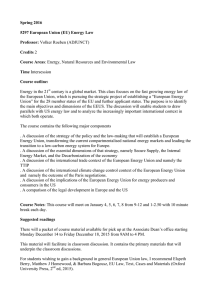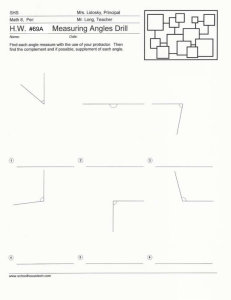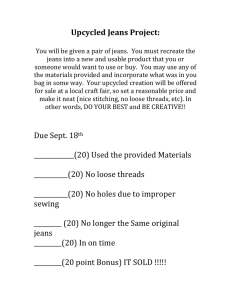
International Journal of Trend in Scientific Research and Development (IJTSRD)
Volume 5 Issue 2, January-February 2021 Available Online: www.ijtsrd.com e-ISSN: 2456 – 6470
Association Rules Analysis using FP-Growth Algorithm to
Make Product Recommendations for Customer
Ni Putu Priyastini Dessy Safitri
Department of Information Technology,
Faculty of Engineering Udayana University, Bukit Jimbaran, Bali, Indonesia
How to cite this paper: Ni Putu Priyastini
Dessy Safitri "Association Rules Analysis
using FP-Growth Algorithm to Make
Product Recommendations for Customer"
Published
in
International Journal
of Trend in Scientific
Research
and
Development (ijtsrd),
ISSN:
2456-6470,
Volume-5 | Issue-2,
IJTSRD38459
February
2021,
pp.528-531,
URL:
www.ijtsrd.com/papers/ijtsrd38459.pdf
ABSTRACT
Companies usually have historical data on sales transactions from month to
month, but unfortunately, they are only used as weekly and monthly reports. If
it is allowed to continue for longer, there will be data growth which results in
data richness but poor information. At the same time, companies often still use
manual methods in their product marketing strategies that have no reference
and are only based on estimates. One of them is the X Fashion Store that sells
various local fashions. X Fashion Store has not used data to develop their
marketing strategy. This study conducted an association rules analysis to
develop a sales strategy. Sales transaction data used is data for December
2020 with a minimum value of support of 25% and a minimum value of
confidence of 80% by processing data using Rapidminer application. FPGrowth algorithm can produce association rules as a reference in product
promotion and decision support in providing product recommendations to
consumers based on predetermined minimum support and confidence values.
The association rule result with the highest lift ratio is 10.51.
Copyright © 2021 by author(s) and
International Journal of Trend in Scientific
Research and Development Journal. This
is an Open Access article distributed
under the terms of
the
Creative
Commons Attribution
License
(CC
BY
4.0)
KEYWORDS: Association, FP-Growth, Product Recomendation
(http://creativecommons.org/licenses/by/4.0)
A. INTRODUCTION
Information technology has been adopted in various sectors,
especially in companies, but there are still companies that
have not utilized it optimally. Companies usually have
historical data on sales transactions from month to month,
but unfortunately, they are only used as weekly and monthly
reports. If it is allowed to continue for longer, there will be
data growth which results in data richness but poor
information. This untreated data will only result in a buildup
of useless data[1].
Companies often still use manual methods in their product
marketing strategies that have no reference and are only
based on estimates. This results in the promotion are not on
target and promotion costs are wasted. The company's
marketing strategy needs to take advantage of computing
technology. Stored sales transaction data can provide
benefits for company management, for example, to increase
sales through an appropriate product sales promotion
strategy[2][3]. Various marketing activities, such as
promotions and packaging for discounts, can be done better
and on target by utilizing this historical data. The majority of
consumers are interested in promotional programs because
they feel they can save money. Conditions like this can be a
means to increase sales, retain customers, and provide
satisfaction to customers.
One of the important information from historical data that
can be used for the benefit of marketing activities is frequent
patterns (FP). This FP contains pattern information that
@ IJTSRD
|
Unique Paper ID – IJTSRD38459
|
often appears from transaction data. One technique for
extracting FP information is to use the association rule as a
data mining method that can identify similarities between
items. The Frequent Pattern-Growth (FP-Growth) algorithm
can be used to form candidate item combinations to apply
associative rules that have a certain frequency value. This
algorithm has been implemented in a variety of applications
[2], [3]. The importance of the association rule can be seen
from two parameters, namely minimum support (the
percentage of item combinations of all transactions) and
minimum confidence (the strength of the relationship
between items in the associative rule).
This FP-Growth algorithm research is different from
previous research, this study aims to examine the
implementation of the algorithm and association rule to the
purchase transaction dataset to provide promotional
product
recommendations
for
customers.
The
implementation was carried out at the X Fashion Store which
was established in early 2018 and sells various local
fashions.The X Fashion Store has not used data to develop
their marketing strategy.The dataset is in the form of sales
transaction data for December 2020. The analysis of the
highest frequency patterns produces a combination of items
that meet the specified minimum support requirements. The
formation of the association rule pattern is done to find the
association rule that meets the minimum confidence of the
high frequencies that have been found.
Volume – 5 | Issue – 2
|
January-February 2021
Page 528
International Journal of Trend in Scientific Research and Development (IJTSRD) @ www.ijtsrd.com eISSN: 2456-6470
B. Research Method
Asociation rules uses a case study in the X Fashion Store.
Association rules analysis is done using FP-Growth
Algorithm. There are several stages of research for
association rules analysis can be seen in Figure 1.
Start
Data Collection
3. Association Rules Analysis using FP-Growth
The association process is carried out using the Rapidminer
application to get the results of the association rules.
Rapidminer is software that contains an integrated
environment for processing data, machine learning, deep
learning, and predictive analysis[2].The FP-Growth
algorithm flow consists of several processes, namely
searching for support item values, building FP-Tree,
searching for frequent item set, searching for support and
confidence values on item set, and obtaining the results of
association rules[4].The flowchart of the FP-Growth
agorithm can be seen in Figure 3.
Start
Data Preprocessing
Input min support
Association Rules Analysis
using FP-Growth
Scan database to get support
value for each item
Association Rules Result
N
Support >=
min support
End
Figure 1Research Stage
2. Data Preprocessing
The preprocessing stage prepares the data obtained from the
data collection stage so that the format is by the research
needs. Sales transaction data is carried out by a data
selection and data transformation. The amount of data
previously contained 246 data, after the data selection, it
became 184 data. The result is a data representation in the
form of a binary matrix data vectorization. This data
vectorization matrix was created to adjust the data
representation format so that it fits the FP-Growth algorithm
data input format in the Rapidminer application. Figure 2 is
the example of binary matrix data vectorization.
Y
1. Data Collection
The data collection stage is the stage for collecting sales data
and literature studies. X Fashion Store does not process data
that is owned and has no reference in promoting products.
Sales data is used for product recommendations, namely
sales transaction data of 246 transactions in December 2020.
Build FP-Tree
Searching for frequent itemset
Searching for support and
confidence values for each
itemset
Association Rules Result
End
Figure 3Flowchart of the FP-Growth Agorithm
Association rule is a rule that states the correlation between
the occurrence rate of several attributes in a dataset [5]. The
terms antecedent and consequent are found in the
association rules. Antecendent to represent the "if" part and
consequent to represent the "then" part. An example of the
form of association rule "A B", where A is the antecedent
and B is the consequent. Antencendent is also called LHS
(Left Hand Side) while the consequent is called RHS (Right
Hand Side), with the interpretation that every purchase of an
item on LHS allows a purchase on RHS[6]. The accuracy of
association rules is support, confidence, and lift ratio.
Support is the frequency of relationships between items in
the data [7]. The support value of an item is obtained by
Formula 1.
(1)
Figure 2the result of data preprocessing
@ IJTSRD
|
Unique Paper ID – IJTSRD38459
|
Volume – 5 | Issue – 2
|
January-February 2021
Page 529
International Journal of Trend in Scientific Research and Development (IJTSRD) @ www.ijtsrd.com eISSN: 2456-6470
Formula 1 is the formula for finding the support value (A),
which is the value of supporting the combination of item A in
the database. The number of transactions containing A is the
appearance of item A in the entire transaction. The number
of transactions is the total number of transactions in the
database. The formula used to find the support value of two
or more items can be seen in Formula 2.
Figure 4Process Association
(2)
Formula 2 is a formula to find support values (A, B), which is
the value of supporting a combination of two items, namely
item A and item B in the database. The number of
transactions containing A and B is the appearance of items A
and B in the entire transaction. Total transactions are the
total number of transactions in the database. Confidence is a
measurement that shows the degree of certainty or truth of
the relationship between items [12]. For example, how often
is item B purchased if the consumer buys item A. The
confidence value of the association rule A B is obtained by
formula 3.
From the process of implementing the FP-Growth algorithm
with the Rapidminer application above it produces five
association rules as follows in the Table 1.
No
1
(4)
4. Association Rules Result
The results of association rules will use to make Customer
Product Recommendations.
C. Literature Study
Previous research conducted by Indrawan and Saputra to
Manage Cross-Selling and Up-Selling for IT Shop. The
research was conducted using the FP-Growth agorithm to
produce association rules with the highest support and
confidence, namely Crimping Set and RJ45 Connector with a
support value of 0.550 and a Confidence value of 0.785[2].
Research conducted by Ikhwan, Nofriansyah, and Sriani,
namely conducting research to support the Education
Promotion Strategy by implementing the fp-growth
algorithm. Information relating to the implementation of
promotions can be quickly available, for example in choosing
a place to be used as education promotion, so that the
management of the campus itself can make decisions
quickly.The resulting association rules are if the student is
from a private high school, his address is Medan and the
origin of his social studies course, then he chooses the
Information Systems Study Program with a 100% confidence
level and is supported by 6% of the overall data[3].
{LightMask, LavJacket}
{KinayJeans}
Lift
0,07
0,93
10,51
2
{Je Pants}
{Liss Shirt}
0,08
0,94
8,63
3
{LavJacket}
{KinayJeans}
0,09
0,94
10,22
4
{KinayJeans}
{LavJacket}
0,09
1
10,22
5
{LightMask, KinayJeans}
{LavJacket}
0,07
1
10,22
(3)
Lift ratio is a measurement that shows the strong
relationship between items in the association rules. The lift
ratio formula can be seen in Formula 4.
Table 1Association Rules Results
Rules
Supp Conf
Table 1isassociation rules result such asfive of the best
association ruleswith a minimum support of 0,25 and a
minimum confidence of 0,8.Rule 1, namely {Light Mask, Lav
Jacket} {Kinay Jeans} shows that of all customers who
bought Light Mask and Lav Jacket, 93% also bought Kinay
Jeans. Rule 2, namely {Je Pants} {Liss Shirt} shows that of
all customers who purchase Je Pants, 94% also buy Liss
Shirts. Rule 3, namely {Lav Jacket} {Kinay Jeans} shows
that of all customers who bought Lav Jacket products, 93%
also bought Kinay Jeans. Rule 4, namely {Kinay Jeans} {Lav
Jacket} shows that of all customers who bought Kinay Jeans
products, 93% also bought Lav Jacket. Rule 5, namely {Light
Mask, Kinay Jeans} {Lav Jacket} shows that of all customers
who bought Light Mask and Kinay Jeans products, 93% also
bought {Lav Jacket}.
The higher the lift ratio value in the association rule, the
greater the accuracy strength of the association process. The
itemset combination in the association rule is valid and
strong if the lift ratio value is more than 1 [8].
Research on the implementation and comparison of
algorithms for market basket analysis was carried out by
Hidayat. This study uses data from the Breiliant Shop to
analyze consumer spending patterns by comparing two
algorithms, namely the a priori algorithm and FP-Growth.
The result of this research is that the two algorithms can be
used to obtain the correlation of product purchase items[5].
D. Result
Association process result in Rapidminer application version
9.8 can be done by entering binary matrix data vectorization.
Then run the model as shown in the figure 4.
@ IJTSRD
|
Unique Paper ID – IJTSRD38459
|
Figure 5Visualization Association Rules
Figure 5 is visualization of the rules. The visualization image
shows that Light Mask, Lav Jacket and Kinay Jeans have a
relationship between items that are often purchased by
Volume – 5 | Issue – 2
|
January-February 2021
Page 530
International Journal of Trend in Scientific Research and Development (IJTSRD) @ www.ijtsrd.com eISSN: 2456-6470
consumers and there is also a relationship between Je Pants
and Liss Shirt items.
The rules formed above can be used as a reference in
product recommendations. Marketing strategies can be
carried out, for example, product bundling (Light Mask, Lav
Jacket and Kinay Jeans will be sold as one saving package),
buy 2 get 1 (if customer buy 2 pcs of Je Pants customer will
get 1 pcs Liss Shirt), and product discounts (get a discount
5% if you buy Je Pants over 5 pcs). Thus, the company has a
reference for handling marketing strategies, not just
estimates. The results of this research can be implemented
by the company to support the marketing strategy. Efforts to
improve results can also be improved, for example by
modifying the minimum support and confidence values to
get a better one or applying other association algorithms,
such as the a priori algorithm.
E. Conclusion
The FP-Growth algorithm can be implemented through
stages in sales transaction data. The association rules that
are formed can be used as a reference for product
recommendations that meet the minimum values of support
and confidence.The association rule with the highest lift ratio
in the {LightMask, LavJacket} -> {KinayJeans} rule is the lift
ratio of 10,51.
References
[1] R. Riszky and M. Sadikin, “Data Mining Menggunakan
Algoritma Apriori untuk Rekomendasi Produk bagi
Pelanggan,” Jurnal Teknologi dan Sistem Komputer,
vol. 7, no. 3, pp. 103–108, 2019.
[2]
I. W. A. Indrawan and K. O. Saputra, “Implementation
of Association Rules to Manage Cross-Selling and UpSelling for IT Shop,” vol. 4, no. 2, pp. 60–63, 2019.
@ IJTSRD
|
Unique Paper ID – IJTSRD38459
|
[3]
A. Ikhwan, D. Nofriansyah, and Sriani, “Penerapan
Data Mining dengan Algoritma Fp-Growth untuk
Mendukung Strategi Promosi Pendidikan ( Studi
Kasus Kampus STMIK Triguna Dharma ),” Saintikom,
vol. 14, no. 3, pp. 211–226, 2015.
[4]
N. Riyadi, M. F. Mulki, and R. Susanto, “Analysis of
Customers Purchase Patterns of E-Commerce
Transactions Using Apriori Algorithm and Sales
Forecasting Analysis With Weighted Moving Average
( WMA ) Method,” Scientific Research Journal (SCIRJ),
vol. VII, no. Vii, pp. 45–58, 2019.
[5]
A. A. Hidayat, A. Rahman, R. M. Wangi, R. J. Abidin, R.
S. Fuadi, and W. Budiawan, “Implementation and
Comparison Analysis of Apriori and fp-growth
Algorithm Performance to Determine Market Basket
Analysis in Breiliant Shop,” Journal of Physics:
Conference Series, vol. 1402, no. 7, 2019.
[6]
M. Fauzy, K. R. Saleh W, and I. Asror, “Penerapan
Metode Association Rule Menggunakan Algoritma
Apriori pada Simulasi Prediksi Hujan Wilayah Kota
Bandung,” Jurnal Ilmiah Teknologi Informasi Terapan,
vol. II, no. 2, pp. 221–227, 2016.
[7]
P. N. Tan, M. Steinbach, and V. Kumar, “Association
analysis: Basic concepts and algorithms,” Introduction
to Data Mining, pp. 327–414, Jan. 2005.
[8]
D. Fitriati, “Implementasi Data Mining untuk
Menentukan Kombinasi Media Promosi Barang
Berdasarkan Perilaku Pembelian Pelanggan
Menggunakan Algoritma Apriori,” in Prosiding Annual
Research Seminar 2016, 2016, vol. 2, no. 1, pp. 472–
480.
Volume – 5 | Issue – 2
|
January-February 2021
Page 531




